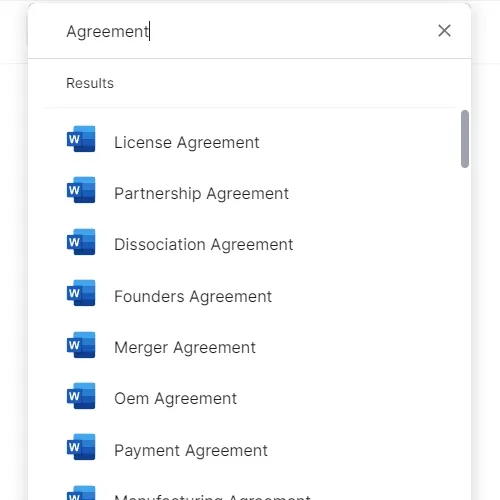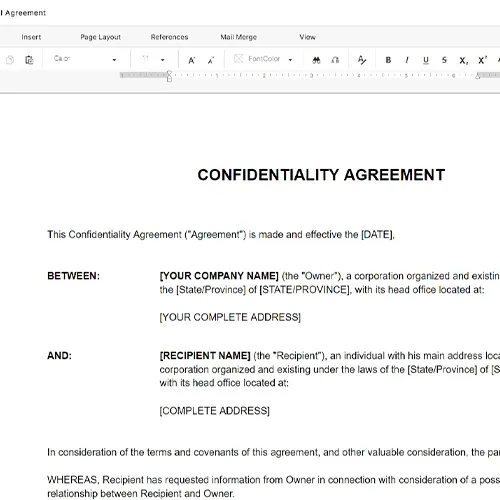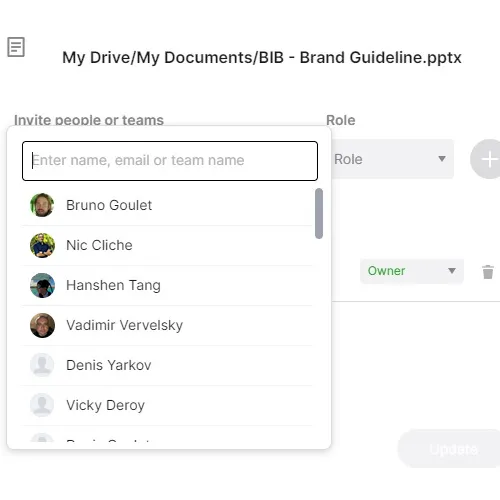How To Develop A Digital Strategy

Document content
This how to develop a digital strategy template has 12 pages and is a MS Word file type listed under our sales & marketing documents.
Sample of our how to develop a digital strategy template:
A Guide to Preparing Your Digital Strategy Step by Step Instructions Guide to Help You Create a Successful Digital Strategy Table of Contents Understanding Digital Strategy 3 Preparing a Powerful Digital Strategy 6 Why Choose Business in a Box 11 Helpful Documents 12 Understanding Digital Strategy What is a Digital Strategy? A digital strategy is a strategic plan used to enhance business performance or achieve specific goals via various digital platforms. To create a successful digital strategy, you require a functional team comprising of information technology (IT) professionals, marketing experts, and executive leaders. This plan specifies your organization's direction to create a competitive advantage with technology and the methods to achieve this objective. These changes may include transforming business models because modern technology allows for it. Your strategy enables you to leverage various innovations to support your unique business goals. Some of the digital platforms you could utilize today as tactics for your digital strategy include mobile apps, company websites, search engines, advertising and social media company pages, email, and digital partnerships with other companies. Digital Marketing Tactics There are different digital marketing tactics that you can utilize to achieve your digital strategy goals. Deciding on the best one to use for your business can be somewhat overwhelming. When choosing the ultimate digital marketing tactics, you need to understand your product, business, and demographics. Below, you will find some of the main types of digital marketing tactics in your pool of options. Search Engine Optimization (SEO) SEO is a tactic to help your website or content rank higher on search engines such as Google, Yahoo, and Bing. There are two tactics used in SEO: On-page SEO - happens on your website Off-page SEO - happens off your website On-page SEO and off-page SEO make your website more user-friendly and trustworthy. To boost your site's SEO traffic, utilize relevant keywords. These are terms that consumers often use when searching for products and services your company offers. Here are some worthwhile SEO tips: Content indexing - Add text transcripts for video and audio content and alt text for images; this allows search engines to read your site content. Have a good link structure - Search engines must "crawl" your site to find content on your website. Keywords and critical targeting - Ensure there is proper placement of keywords. Write quality content and make sure to use keywords in the headers and on the crawl-able pages. Pay-Per-Click (PPC) Pay-per-click is paid advertising on search engines. PPC increases search traffic to online businesses. In simpler terms, PPC ads are what you see when browsing the web. You'll also find them on mobile apps and in YouTube videos. Fortunately, this digital marketing strategy allows you to choose your audience. Your advertisements could be visible to users in a specific geographic area or worldwide. Social Media Marketing Social media marketing is utilizing social media platforms to promote your services or products. It enables you to engage with new clients and already existing customers. Examples of these platforms are: Facebook Instagram Twitter Using targeting ads and campaigns will increase your following on social media, helping you grow through this platform. For example, Facebook collects data about your interests and likes and demographic data like your age. This information is always available to Facebook business users, who can use the information to create targeted ads on the selected news feed to promote products and services. Use tools such as Google analytics, return on investment (ROI), and customer response rate to measure your success. Remember that for successful social media marketing, a data-driven plan and creative thinking will be useful. Content Marketing Content marketing is a digital marketing strategy used to engage and attract clients. It entails creating videos, articles, and podcasts with relevant and valuable data. To improve your content marketing, deliver the right content at each sales cycle stage, which includes the following: Awareness stage - Focuses on your client's top concerns. The best content for this stage is blog posts, articles, and videos. Consideration stage - Educate readers by describing your products and services. The best content for this stage is how-to videos and articles. Closing stage - This stage is all about stating the benefits of what you sell. The best content for this stage is product videos, research reports, and case studies. In addition, post videos and blogs to build a loyal user base. It is all about listening to your customers' needs and offering them precisely what they want. If your content is exceptional, your traffic will doubtlessly increase. Preparing a Powerful Digital Strategy Regardless of whether you've just established your company or you've been operating it for a while, an effective digital marketing strategy is critical. You need it to widen your market reach. But how can you develop the perfect digital marketing plan to guarantee the success of your organization? Check out these excellent guidelines to help you do so. Determine the Story Behind Your Brand Consumers are exposed to thousands of brands each day and they are only attracted to those that leave a strong impression. In order to gain the attention of a consumer, your story must matter to them. The story behind your brand must lead to a promise - a promise to solve their problem (and your brand is the solution to that problem). A compelling story about your brand will allow you to stand out from your competition. Clearly articulating your brand's story will also tell consumers what they can expect from your brand. Set Your Digital Marketing Goals A strategy is a plan that helps you outline one or more objectives and achieve these stated objectives. Your business idea will determine the goals you want to achieve. For example, let's say you own a pastry shop. Your goal could be to: Raise brand awareness; let more people know that your bakery exists. Generate more sales. Look for ways to get ahead of the competition. Once you clear your bakery business goals, the next step is to figure out how digital marketing can help achieve them. Digital marketing allows you have an idea of what to do to reach your business goal. Set What Key Performance Indicators to Measure You now know the goals you want to achieve through digital marketing; the next step is to determine which key performance indicators to measure. For instance, if your digital marketing goal is to generate 60% leads through different online channels, you need to measure your conversions and know what digital marketing tools to use. These tools help you work efficiently and implement your digital marketing strategy. Evaluate Your Existing Strategy Although analyzing your current digital marketing strategy can be time-consuming, it is important
3,000+ Templates & Tools to Help You Start, Run & Grow Your Business

Document content
This how to develop a digital strategy template has 12 pages and is a MS Word file type listed under our sales & marketing documents.
Sample of our how to develop a digital strategy template:
A Guide to Preparing Your Digital Strategy Step by Step Instructions Guide to Help You Create a Successful Digital Strategy Table of Contents Understanding Digital Strategy 3 Preparing a Powerful Digital Strategy 6 Why Choose Business in a Box 11 Helpful Documents 12 Understanding Digital Strategy What is a Digital Strategy? A digital strategy is a strategic plan used to enhance business performance or achieve specific goals via various digital platforms. To create a successful digital strategy, you require a functional team comprising of information technology (IT) professionals, marketing experts, and executive leaders. This plan specifies your organization's direction to create a competitive advantage with technology and the methods to achieve this objective. These changes may include transforming business models because modern technology allows for it. Your strategy enables you to leverage various innovations to support your unique business goals. Some of the digital platforms you could utilize today as tactics for your digital strategy include mobile apps, company websites, search engines, advertising and social media company pages, email, and digital partnerships with other companies. Digital Marketing Tactics There are different digital marketing tactics that you can utilize to achieve your digital strategy goals. Deciding on the best one to use for your business can be somewhat overwhelming. When choosing the ultimate digital marketing tactics, you need to understand your product, business, and demographics. Below, you will find some of the main types of digital marketing tactics in your pool of options. Search Engine Optimization (SEO) SEO is a tactic to help your website or content rank higher on search engines such as Google, Yahoo, and Bing. There are two tactics used in SEO: On-page SEO - happens on your website Off-page SEO - happens off your website On-page SEO and off-page SEO make your website more user-friendly and trustworthy. To boost your site's SEO traffic, utilize relevant keywords. These are terms that consumers often use when searching for products and services your company offers. Here are some worthwhile SEO tips: Content indexing - Add text transcripts for video and audio content and alt text for images; this allows search engines to read your site content. Have a good link structure - Search engines must "crawl" your site to find content on your website. Keywords and critical targeting - Ensure there is proper placement of keywords. Write quality content and make sure to use keywords in the headers and on the crawl-able pages. Pay-Per-Click (PPC) Pay-per-click is paid advertising on search engines. PPC increases search traffic to online businesses. In simpler terms, PPC ads are what you see when browsing the web. You'll also find them on mobile apps and in YouTube videos. Fortunately, this digital marketing strategy allows you to choose your audience. Your advertisements could be visible to users in a specific geographic area or worldwide. Social Media Marketing Social media marketing is utilizing social media platforms to promote your services or products. It enables you to engage with new clients and already existing customers. Examples of these platforms are: Facebook Instagram Twitter Using targeting ads and campaigns will increase your following on social media, helping you grow through this platform. For example, Facebook collects data about your interests and likes and demographic data like your age. This information is always available to Facebook business users, who can use the information to create targeted ads on the selected news feed to promote products and services. Use tools such as Google analytics, return on investment (ROI), and customer response rate to measure your success. Remember that for successful social media marketing, a data-driven plan and creative thinking will be useful. Content Marketing Content marketing is a digital marketing strategy used to engage and attract clients. It entails creating videos, articles, and podcasts with relevant and valuable data. To improve your content marketing, deliver the right content at each sales cycle stage, which includes the following: Awareness stage - Focuses on your client's top concerns. The best content for this stage is blog posts, articles, and videos. Consideration stage - Educate readers by describing your products and services. The best content for this stage is how-to videos and articles. Closing stage - This stage is all about stating the benefits of what you sell. The best content for this stage is product videos, research reports, and case studies. In addition, post videos and blogs to build a loyal user base. It is all about listening to your customers' needs and offering them precisely what they want. If your content is exceptional, your traffic will doubtlessly increase. Preparing a Powerful Digital Strategy Regardless of whether you've just established your company or you've been operating it for a while, an effective digital marketing strategy is critical. You need it to widen your market reach. But how can you develop the perfect digital marketing plan to guarantee the success of your organization? Check out these excellent guidelines to help you do so. Determine the Story Behind Your Brand Consumers are exposed to thousands of brands each day and they are only attracted to those that leave a strong impression. In order to gain the attention of a consumer, your story must matter to them. The story behind your brand must lead to a promise - a promise to solve their problem (and your brand is the solution to that problem). A compelling story about your brand will allow you to stand out from your competition. Clearly articulating your brand's story will also tell consumers what they can expect from your brand. Set Your Digital Marketing Goals A strategy is a plan that helps you outline one or more objectives and achieve these stated objectives. Your business idea will determine the goals you want to achieve. For example, let's say you own a pastry shop. Your goal could be to: Raise brand awareness; let more people know that your bakery exists. Generate more sales. Look for ways to get ahead of the competition. Once you clear your bakery business goals, the next step is to figure out how digital marketing can help achieve them. Digital marketing allows you have an idea of what to do to reach your business goal. Set What Key Performance Indicators to Measure You now know the goals you want to achieve through digital marketing; the next step is to determine which key performance indicators to measure. For instance, if your digital marketing goal is to generate 60% leads through different online channels, you need to measure your conversions and know what digital marketing tools to use. These tools help you work efficiently and implement your digital marketing strategy. Evaluate Your Existing Strategy Although analyzing your current digital marketing strategy can be time-consuming, it is important
Easily Create Any Business Document You Need in Minutes.

Access over 3,000+ business and legal templates for any business task, project or initiative.

Customize your ready-made business document template and save it in the cloud.

Share your files and folders with your team. Create a space of seamless collaboration.
Templates and Tools to Manage Every Aspect of Your Business.
Business in a Box Covers Every Business Department
Includes 16 Types of Business Documents You Need
and Achieve Your Business Goals Faster.
